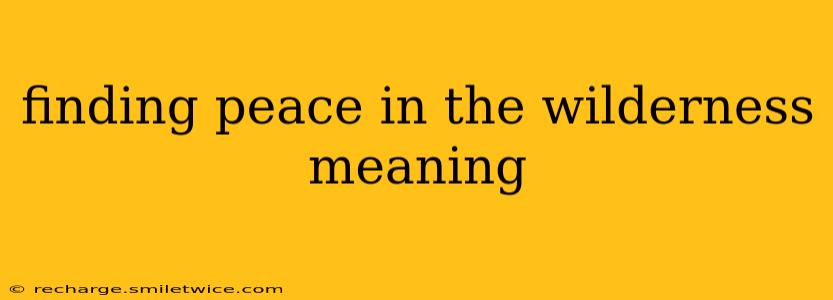Finding peace in the wilderness is more than just a trendy phrase; it's a deeply human experience. For centuries, humans have sought solace and rejuvenation in the natural world, escaping the clamor of daily life to reconnect with something larger than themselves. But what exactly is this peace, and how does the wilderness facilitate it? This exploration delves into the meaning behind this powerful connection.
What Does "Finding Peace in the Wilderness" Mean?
At its core, "finding peace in the wilderness" signifies discovering a sense of tranquility and inner calm amidst the natural environment. This peace isn't simply the absence of noise; it's a profound shift in perspective, a release from the anxieties and stresses of modern life, and a re-establishment of a connection to something primal and essential. It's about experiencing a sense of belonging, awe, and even spiritual renewal within the wild.
This peace can manifest in various ways: a feeling of profound calm, a heightened awareness of the present moment, a sense of wonder at the beauty of the natural world, a feeling of being connected to something larger than oneself, or even a deeper understanding of one's place in the universe.
How Does the Wilderness Promote Peace?
Several factors contribute to the restorative power of the wilderness:
-
Sensory Deprivation (in a good way): While seemingly contradictory, the wilderness can offer a type of sensory deprivation that's incredibly calming. The absence of constant stimulation – the incessant notifications of our phones, the relentless noise of traffic, the visual clutter of cityscapes – allows our minds to quiet down and rest.
-
Nature's Soundscapes: The sounds of nature – the rustling of leaves, the singing of birds, the gentle lapping of water – have a naturally soothing effect on our nervous systems. These sounds are often described as "white noise" for the mind, helping to block out distracting thoughts.
-
Exposure to Natural Light: Exposure to natural light, particularly sunlight, helps regulate our circadian rhythms and improve our mood. This natural light can help reduce symptoms of depression and anxiety, promoting feelings of peace and well-being.
-
Physical Activity and Connection to the Body: Hiking, camping, and other outdoor activities offer a healthy dose of physical exercise, releasing endorphins and reducing stress. The connection to our bodies through these activities can also enhance our self-awareness and contribute to a feeling of groundedness.
-
Escaping the Digital World: Stepping away from the constant connectivity of the digital world allows us to disconnect from the pressure of emails, social media, and the news cycle. This digital detox can provide much-needed mental space and clarity.
What are the Benefits of Finding Peace in the Wilderness?
The benefits of experiencing peace in the wilderness extend far beyond a temporary feeling of calm. Research suggests that spending time in nature can:
- Reduce stress and anxiety: Studies have shown that exposure to nature can lower cortisol levels (the stress hormone) and reduce feelings of anxiety.
- Improve mood and boost happiness: Spending time outdoors can increase levels of serotonin and dopamine, neurotransmitters associated with mood regulation and happiness.
- Enhance creativity and cognitive function: Nature has been shown to improve focus, attention span, and creativity.
- Promote physical health: Outdoor activities improve cardiovascular health, strengthen muscles, and boost overall fitness.
- Foster a sense of connection and belonging: Spending time in nature can foster a sense of awe and wonder, strengthening our connection to something larger than ourselves.
How Can I Find Peace in the Wilderness?
Finding peace in the wilderness doesn't require scaling a mountain or embarking on a multi-day backpacking trip. It's about intentionality and mindful engagement with nature. Here are a few suggestions:
- Take a walk in a park: Even a short walk in a local park can provide a sense of calm and rejuvenation.
- Go for a hike: Explore a nearby trail and immerse yourself in the beauty of the natural world.
- Spend time by the water: The sound and sight of water can be incredibly soothing.
- Camp outdoors: Spending a night under the stars can be a transformative experience.
- Practice mindfulness in nature: Pay attention to the sights, sounds, and smells around you, and let go of your thoughts and worries.
Is it better to be alone or with others when seeking peace in the wilderness?
Whether you find peace alone or with others in the wilderness depends entirely on your personality and preferences. Some people find deep solitude and introspection when alone in nature, while others find joy and companionship in sharing the experience with friends or family. Both approaches can be equally effective in promoting peace and well-being.
What type of wilderness is best for finding peace?
The "best" type of wilderness for finding peace is subjective and depends on individual preferences. Some people prefer the tranquility of a quiet forest, while others find rejuvenation in the vastness of a mountain range or the dynamism of a coastline. The key is to choose a setting that resonates with you and allows you to disconnect from the stresses of daily life.
Ultimately, finding peace in the wilderness is a personal journey. It’s about consciously choosing to connect with the natural world and allowing it to soothe your soul. The benefits are numerous and profound, offering a pathway to a calmer, more balanced, and more meaningful life.
